Eye Drops
Allergy eye drops are specially formulated solutions designed to alleviate symptoms associated with ocular allergies. When allergens like pollen, pet dander, or dust come into contact with the eyes, they can cause itching, redness, watering, and swelling. Allergy eye drops work by stabilizing mast cells, blocking histamines, or reducing inflammation, providing relief from these uncomfortable symptoms. Read More…

-
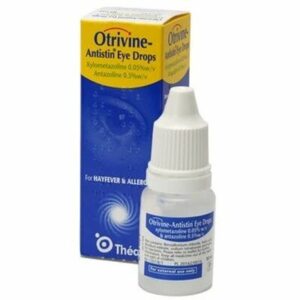
Otrivine Antistin Eye Drops 10ml
- Relieves Common Allergy Symptoms
- Effective In 30 Mins To 1 Hour
- Active Ingredients: Xylometazoline and Antazoline
£8.09 Select options -
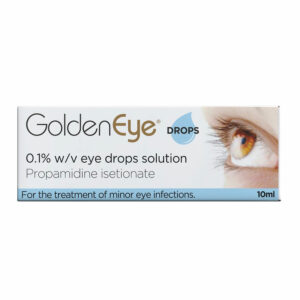
GoldenEye Eye Drops 10ml
- Active Ingredient : Propamidine Isetionate
- Treats Minor Eye Infections & Irritations
- Buy With Confidence From UK Registered Pharmacy
£6.89 Select options -
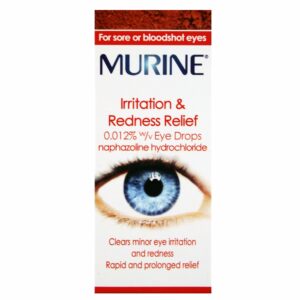
Murine Irritation & Redness Relief Eye Drops – 10ml
- Clears minor eye irritation and redness
- Active Ingredient: Naphazoline Hydrochloride
- Recommended by UK doctors
£4.79 Add to basket -
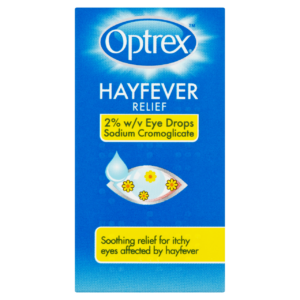
Optrex Hayfever/Relief Allergy Eye Drops 10ml
- Relieves Sore And Itchy Eyes
- Active Ingredient: Sodium Cromoglicate
- Anti-Inflammatory Action
£8.49 Select options -
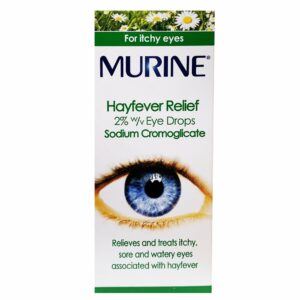
Murine Hayfever Relief 2% Eye Drops – 10ml
- Fast relief from hayfever
- Active Ingredient: Sodium Cromoglicate
- Recommended by UK doctors
£6.49 Add to basket -
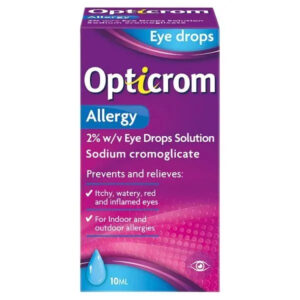
Opticrom Allergy Eye Drops – 10ml
- Sodium cromoglicate
- Prevents and relieves itchy, watery, red and inflamed eyes
- For indoor and outdoor allergies
£5.59 Select options -
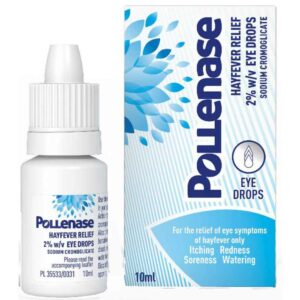
Pollenase Hayfever Relief 2% w/v Eye Drops 10ml
- Effective Hayfever Treatment
- Active Ingredient: Sodium Cromoglicate
- Suitable For Children Aged 6 And Over
£6.89 Select options -
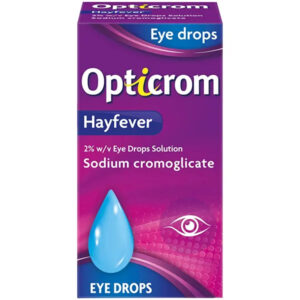
Opticrom Hayfever Eye Drops – 10ml
- Soothes and relieves symptoms of hayfever
- Targeted relief for watery eyes, itchy eyes and red eyes
- For adults and children
£5.59 Select options -
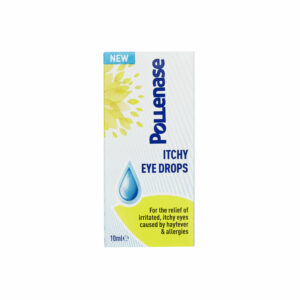
Pollenase Itchy Eye Drops – 10ml
- For the relief of irritated, itchy eyes caused by hay fever and allergies
- pH balanced to be kind to eyes
- Suitable for use with contact lenses
£3.29 Read more -
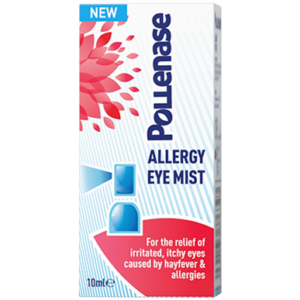
Pollenase Allergy Eye Mist – 10ml
- Simply spray onto closed eyelids
- pH balanced to be kind to eyes
- Suitable for use with contact lenses
£8.99 Add to basket
-
Understanding Your Options
Eye allergies, also known as allergic conjunctivitis, are often triggered by common allergens like pollen, dust, and pet dander. These irritants can cause your eyes to become red, watery, and itchy. However, with the right over-the-counter (OTC) remedies, you can manage these symptoms and enjoy your day without discomfort.
-
Identifying Symptoms: Selecting the Right Hay fever Eye Drops
Hay fever, a common allergic reaction to pollen, can significantly affect your eyes. Choosing the right eye drops is crucial for alleviating symptoms. Our online pharmacy offers a variety of options, including:
Antihistamine Drops: These provide quick relief by alleviating symptoms such as itching and redness.
Decongestant Drops: Perfect for reducing redness, these drops offer cosmetic relief for bloodshot eyes caused by allergies.
-
Diagnosis
Finding the correct allergy eye drops can help you maintain your daily routine without the interruption of allergy symptoms. When selecting eye drops, look for those that offer:
Itch Relief: Target the persistent itch associated with eye allergies, reducing the risk of further irritation.
Redness Reduction: Restore the natural appearance of your eyes by minimising redness.
Watery Eye Management: Keep your vision clear by controlling excessive tearing.
Available Treatments: Health Considerations and AdviceWhile most allergy eye drops are safe for use, individual health conditions like contact lens wear, pregnancy, and pre-existing eye issues may influence your choice. Our pharmacy services provide detailed product information and health advice to ensure you make informed decisions about your allergy management.
-
Prevention Strategies
Prevention tips for minimizing exposure and protecting your eyes:
Limit Outdoor Activities: When pollen counts are high, try to stay indoors as much as possible. This can help reduce your exposure to allergens that trigger eye allergies.
Wear Protective Eyewear: Sunglasses or protective glasses can act as a barrier between your eyes and airborne allergens, providing an extra layer of protection when you’re outdoors.
Maintain Indoor Air Quality: Use air purifiers with HEPA filters to reduce the presence of allergens in your home. Regularly changing air filters in your heating and cooling systems can also help.
Keep Windows Closed: During allergy season, keep windows and doors shut to prevent pollen and other allergens from entering your home.
Practice Good Hygiene: Wash your hands frequently and avoid touching or rubbing your eyes to prevent the transfer of allergens.
Clean Regularly: Dust and vacuum your home regularly to reduce the accumulation of allergens like dust mites and pet dander.
Shower Before Bed: Taking a shower before bedtime can help remove pollen and other allergens from your skin and hair, reducing the risk of eye irritation while you sleep.
Use Allergen-Proof Bedding: Encase your pillows, mattress, and box springs in allergen-proof covers to protect against dust mites.
Stay Hydrated: Drinking plenty of water can help maintain healthy tear production, which is essential for flushing allergens out of your eyes.
By implementing these tips, you can reduce your exposure to eye allergens and minimize the occurrence of allergic conjunctivitis symptoms.












